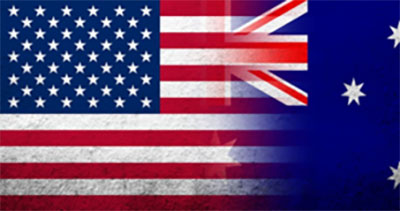Life on the West Island Who owns our big business?
11 October 2023

Most West Islanders probably assume that the nation’s top twenty listed big businesses are mostly owned by local investors. But two recent analyses from reputable sources show that they are completely wrong. Our largest companies are almost all majority-owned overseas, and to make thing worse, they are gouging bloated profits and in many cases paying almost no West Island taxes.
The most detailed analysis comes from Clinton Fernandes, Professor of International and Political Studies at the University of New South Wales in Canberra, part of the Australian Defence Force Academy. He is an Australian historian and academic who is a former secret service officer and is now primarily concerned with West Island national security, in particular intelligence matters and the nation's relations with its Southeast Asian neighbours.
The research by Professor Fernandes found that fifteen of the country’s largest corporations are majority owned by US investors, including Commonwealth Bank, BHP (“the Big Australian”), Wesfarmers (owner of Coles) and Woolworths, and that all of the “big four” banks are majority US-owned. Much of this foreign ownership is disguised through the use of nominee companies, which are nominally registered on the West Island but are in fact wholly owned by overseas investors.
Professor Fernandes highlighted the impacts of this high level of foreign ownership, including:
- The Foreign Investment Review Board, the body which advises on “national interest” when overseas investors attempt to buy Australian companies, knocks back only about 2 percent of foreign acquisition proposals.
- Corporate profiteering and price gouging is responsible for around 60 percent of Australia’s cost-of-living crisis.
- Excess profits have been a major driver of inflation since the COVID-19 pandemic began.
- 85 percent of items in the average supermarket trolley are made by foreign-owned companies.
- The majority of profits made by foreign-owned corporations go overseas.
- Almost 800 big businesses paid no company tax last year, and 168 have paid no tax at all since 2013.
Influential American financial and business analysis organisation Bloomberg also studied ownership of the West Island’s major corporations. In a report issued through Bloomberg Professional Terminal in August this year, they found extraordinarily high levels of foreign ownership of the nation’s big businesses. Some examples were:
- Rio Tinto Ltd 95.16%
- BHP Group Ltd 94.41%
- Fortescue Metals Group 89.16%
- CSL Ltd 86.52%
- Westpac Banking Corp 84.00%
- National Australia Bank 82.30%
- Commonwealth Bank 80.84%
- ANZ Banking Group 75.86%
- Macquarie Group Ltd 69.66%
Despite widespread community concern at the level of foreign ownership of big business, there is little official information on its exact extent. In a recent paper on the issue, The Australia Institute commented:
A potential reason for this lack of detail is the public sensitivity to it. In 2011 the Australian Greens commissioned a study into the level of foreign investment in the Australian mining industry.8 The study concluded that 83% of the mining industry is foreign owned, an estimate later supported by Treasury analysis that put foreign ownership share of major mining projects at 86%. While the Greens analysis was not seriously contested, Greens leader Bob Brown was declared a “racist” by the mining lobby group the Minerals Council of Australia, showing the public and political sensitivity of prominent industries and corporations being perceived as overly foreign owned and influenced. Despite, or perhaps because of, the sensitivity to this information, there is little data available on the degree of foreign investment in corporations listed or operating in Australia.
The research by Bloomberg and Professor Fernandes has produced statistical evidence that much of West Island big business is foreign owned. We are routinely told how important foreign investment is, including by official sources including the Tax Office, Department of Foreign Affairs and Trade and Treasury. These official pronouncements usually state that foreign investment is “on our terms.” But the alarming data shows that the majority of these foreign-owned corporations are making excessive profits and minimising their tax contributions, often to zero.
The Australia Institute concludes:
Despite the importance that Australian governments place on foreign investment and on its proper regulation, data on it is scarce. There is practically no data available to the public on the level of Australian beneficial ownership of major corporations in key sectors of the economy such as banking, mining and energy. Australia’s moves towards a beneficial ownership register are a good first step in addressing this issue. However, there is little sign of progress after eight months of consultation.
Some of the “missing” data has now been revealed by the research of Professor Fernandes and Bloomberg. Will West Island parliaments now take action to ensure that foreign investors do not continue to gouge the public with excessive profits and that they pay their way with appropriate taxation contributions? Unfortunately, history shows that such steps are unlikely.